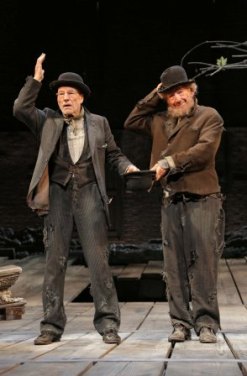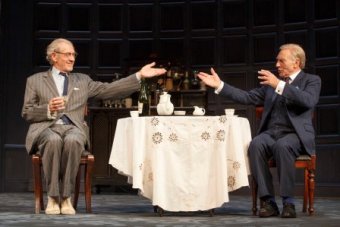Review: Waiting for Godot & No Man's Land

Patrick Stewart and Ian McKellen in Waiting for Godot
(Photo by Joan Marcus)
Be sure not to rush out during the curtain calls of the new revival of Waiting for Godot starring Ian McKellen and Patrick Stewart. After taking their bows, the veteran British thespians break into a song and dance routine that seems right out of vaudeville. The cutesy moment is reflective of the lighthearted nature of director Sean Mathias’ production being performed in repertory with Harold Pinter’s No Man’s Land.
Younger theatergoers thrilled by the prospect of seeing the stars of such screen blockbusters as the Star Trek, X-Men and Lord of the Rings series may well find themselves befuddled by these two ingeniously paired, willfully obscure classics. But if luring them in with the presence of these iconic screen stars is what it takes, so be it.
Godot is by far the more accessible of the two; no small irony considering how its meanings have been endlessly debated over the years. That’s because the production takes pains to emphasize the humor of the piece, often at the expense of its stark bleakness. Indeed, Stewart’s Vladimir and McKellen’s Estragon are here such cuddly partners in scene stealing that it’s no wonder that their escapades were greeted several times by the cry, “Oh, it’s so cute” from the young woman sitting behind me.
Her reaction, not one usually encountered while seeing this existential drama, was not inappropriate. Whether engaging in an elaborate hat switching routine with the aplomb of silent screen comedians or performing such bits of comic business as practically launching into a tap dancing routine after trying on a new pair of shoes, the actors repeatedly milk the piece for laughs both intended and not.
The theatricality of their approach is echoed by Stephen Brimson Lewis’ imaginative set design. Rather than the usual barren apocalyptic wasteland, the action is set in a decrepit old theater that is literally falling apart, with a lone tree bursting through the wooden floorboards. It’s doubtful that Beckett would have approved, but it’s certainly a memorable image.
Not surprisingly, the actors--longtime friends and screen collaborators whose onstage chemistry is palpable--handle the language beautifully. When Estragon comments that their encounter with Lucky and Pozzo certainly made the time pass, Stewart brings down the house with his perfectly timed deadpan response: “It would have passed anyway.”
But for all the actors’ undeniable technical expertise, the production never quite succeeds in mustering up the necessary nihilism, summed up by the repeated phrase, “Nothing to be done.” Even the scenes involving the menacing Pozzo (Shuler Hensley) and his hapless servant Lucky (Billy Crudup) are less chilling than usual, as if not to usurp the air of jollity on display. This Godot certainly earns laughs, but it’s hard to imagine that the play was ever intended to be a feel good experience.

Ian McKellen and Patrick Stewart in No Man's Land
(Photo by Joan Marcus)
That’s certainly not the problem with No Man’s Land. The rarely performed 1975 work, last seen on Broadway nearly two decades ago in a production starring Jason Robards and Christopher Plummer, is one of Pinter’s more ambiguous efforts, and that’s saying something. It concerns the encounter between two elderly men, Hirst (Stewart) and Spooner (McKellen), who after meeting in a pub have retired to the former’s palatial townhouse where they drink and talk late into the night. Gradually we discern that Hirst is a distinguished man of letters, while Spooner is a failed poet who may or may not have been his former Oxford classmate.
The exact nature of their relationship remains ever mysterious, summed up by the opening line of the play in which the alcoholic Hirst, offering his companion a drink, asks “As it is?” The later appearance of his apparent servants Foster (Crudup) and Briggs (Hensley) invites further questions, as they seem more intent on leading their boss towards self-destruction than protecting him.
The oblique nature of the proceedings is alleviated by the playwright’s pungently poetic dialogue and the hugely entertaining performances by the two leads, who handle the verbal and physical demands of their roles with dazzling dexterity. Stewart seems barely in control of his body as his Hirst lurches around drunken stupor, while McKellen infuses the smallest gestures with inspired moments of comic brilliance.
What the play all adds up to is anyone’s guess. But in any case, it’s a pleasure to watch these old pros take such delight both in each other and the material. At an age where they could comfortably rest on their laurels or simply rake continue in the big bucks, they’re instead bringing new audiences to this challenging drama whose meanings remain ever elusive.
Cort Theatre, 138 W. 48th St. 212-239-6200. www.telecharge.com. Through March 2.
| Print article | This entry was posted by Frank on 11/25/13 at 05:07:03 am . Follow any responses to this post through RSS 2.0. |